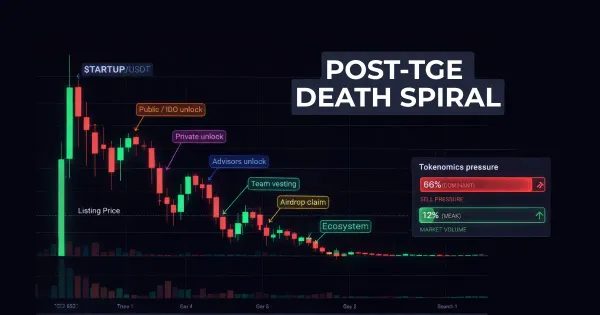Co-Founder Conflict: The Simple Rules That Save Startups
Co-founder conflict kills more startups than market risk. This straight-talk guide shows the simple rules and a lightweight founders agreement that turn hard talks into fast, fair decisions so your team can focus on building.

Startup founders are a special breed. We over-trust, over-commit, and assume the other person hears the same sentence we said in our heads. Then life happens. One founder needs a salary to survive. Another gets an offer. A baby arrives. Burnout arrives. Without a written rulebook, “we’ll be fair” turns into “what did we even agree on.”
This isn’t theory. After too many post-mortems, here’s the uncomfortable pattern: co-founder conflict beats market risk. First Round Review cites research that 65% of failed startups point to interpersonal issues in the founding team.
The cure isn’t a 40-page contract. It’s a short founders agreement that makes hard conversations boring and fast. This simple document, signed early, can literally save your relationship with co-founders and protect your startups from being destroyed due to internal conflicts.
“Fair” does not exist without a document
You can’t feel your way to fairness. You have to define it. On paper.
Common traps that look fair on day one and blow up later:
- 50/50 by default. On a Day one, motivation of all co-founders is balanced. Month nine, one founder pulls 70-hour weeks while the other takes two long breaks. Still fair at 50/50? Without vesting and clear expectations, every extra hour feels like theft.
- Salary asymmetry. One founder has savings and waives salary for a year. Two others draw modest salaries. When the company hits revenue, is equal equity still fair to the one who carried personal risk?
- “CTO premium” with no time test. A technical co-founder demands a larger slice on day one, then exits in month six. Without a vesting and repurchase clause, you gift a permanent tax on the company.
- Invisible work. Fundraising, hiring and customer discovery don’t show up in Git logs. If your agreement doesn’t value non-code work, resentment grows in the dark.
A document forces specificity. Specificity prevents stories.
Three true-to-life stories
(and there are many more when you dive in!)
1) The missing cliff that killed a round.
Two friends split 50/50 with no vesting “because we’re adults.” One leaves after year one. Angels pass because 50% sits with a non-contributor. This pattern is everywhere on r/startups: founders begging for fixes once a fully vested partner walks. The consistent advice from experienced operators is simple: standard four-year vesting with a one-year cliff, and repurchase rights on departure.
2) IP roulette with enterprise procurement.
A founder ships v1 on a personal GitHub using an old employer’s laptop. No IP assignment. First enterprise deal asks for an IP warranty. Everything stops while lawyers unwind ownership. This shows up in countless diligence stories and is a top red flag for investors during audits. Harvard’s Startup Guide also stresses early structure to avoid later conflict around who owns what.
3) The $157.5M lesson on “who’s a founder”.
Snapchat’s early collaborator Reggie Brown sued claiming contribution and co-founder status. Snap settled for roughly $157.5M, as disclosed in its SEC filings and widely reported. Labels were fuzzy. Paper was late. Expensive clarity followed.
What a founders agreement actually decides
Keep it short and plain. Decide these ten items and you’ll avoid 90% of drama:
- Equity split with a written rationale.
- Vesting and cliff. Default: 4 years, 1-year cliff, monthly thereafter.
- Decision rights. Who is CEO. Who breaks ties. What needs unanimous consent.
- Time commitment. Full-time date. Acceptable side gigs. Availability expectations.
- Cash vs sweat. Founder salaries, expense policy, and how loans are repaid.
- IP ownership. Code, designs, data, domains belong to the company. Assignment signed.
- Leaving scenarios. Good leaver vs bad leaver, repurchase mechanics, price.
- Governance. Basic board or advisor setup. Who approves what thresholds.
- Performance remedies. How to reset scope, and, if needed, remove a founder.
- Dispute path. Internal escalation, then mediation or arbitration in a named venue.
Y Combinator and First Round have hammered these themes for years: decide early, write it down, and assume your memory will lie to you later.
The 60-minute founders session (use this script)
Block one hour. Open a shared doc. Work top to bottom. No speeches. Decide.
- Equity: current split and why it’s fair given role and risk.
- Vesting: 4y/1y cliff by default. Any deviation requires a written reason.
- Roles: CEO named. Hiring and firing authority named.
- Decisions: budget cap for solo approval; what needs two or all signatures.
- Time: weekly hours, vacation expectations, on-call rules.
- Salary: now, after funding, who can approve raises.
- IP: assignment signed today; move repos to company org today.
- Leaving: good vs bad leaver definitions and repurchase terms.
- Capital: founder loans terms; order of repayment.
- Disputes: mediation contact and city. Put the calendar review in six months.
No need to complicate things: Sign it. Store it. Email yourselves a PDF.
“We’re already late. What now?”
- Document the present. Capture who owns what, who does what, who funded what.
- Retro-vest. Convert some or all founder equity to a vesting schedule going forward.
- Clean IP. Sign assignments, move assets under the company.
- Name a decider. Indecision kills more teams than wrong decisions.
- Tell investors. “We cleaned up governance” is a green flag, not a confession.
Investor reality check
Investors tolerate product risk and market risk. They avoid cap table risk. Clean vesting and clear decision rights are diligence items, not “nice to haves.” Harvard’s dataset on 1,300 startups shows most teams lock splits too early and misprice future contribution, which is exactly what vesting corrects.
Quick FAQ founders actually ask
Isn’t a contract insulting if we’re friends?
No. It protects the friendship from the company’s stress. Couples use prenups. Founders need this even more.
Equal split or not?
YC argues near-equal often makes sense because all the hard work is ahead, but only with proper vesting and roles. Equal without vesting is a trap.
Can we start simple and lawyer up later?
Yes. Start with a plain-English agreement. When you raise, have counsel polish it.
What if someone refuses vesting?
That’s your signal. Either they expect to leave, or they want leverage over the company. Both are risks you can choose to accept or not.
Do we really need IP assignment now?
Yes. Procurement will force it later at the worst possible time. Clean it now.
Where to start without stalling
If you need a neutral script to drive this conversation and a fill-together draft, grab the Founders Agreement Template in the innMind Knowledge Base. It’s written in plain English and plugs directly into the 60-minute session above. Use it, tailor it, then let your lawyer tighten language when the time is right.
Protect your company. Protect your relationships with co-founders. Make the hard parts boring so the important parts can be hard again.
Further reading and ready-to-use templates
SAFE: Simple Agreement for Future Equity
A modern SAFE that is easier to complete and suitable for both US and international investors. Built to reduce legal friction for first checks and to help founders understand cap, discount, and investor terms without legalese. Includes a Token Warrant Agreement for crypto and Web3 cases.
SAFT Template for Web3 Startups + 2 Essential Exhibits
A complete SAFT package tailored for token sales with clear clauses, a Token Allocation Schedule, and Investor KYC and AML exhibits. Designed to save time, lower legal risk, and give founders a solid starting point for compliant fundraising.
Looking for more founder tools, legal templates, and growth resources
Explore the full InnMind Knowledge Base.





